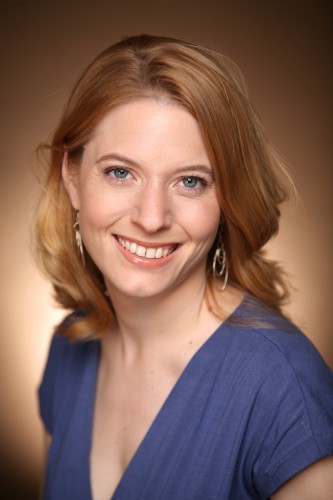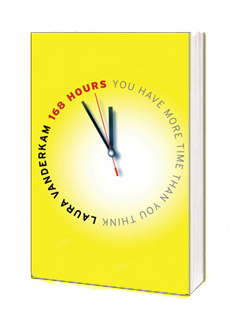My friend Kathryn introduced me to Laura, because she thought Laura’s new book, 168 Hours: You Have More Time Than You Think, and the philosophy it evinces, would be of interest to me. In our very first exchange, Laura wrote: “I think one of the reasons people feel like they have less time than they do is that they aren’t present when they’re doing whatever they’re doing.” And I just nodded and said, well, yes. At least that is true for me.
Laura’s book “is a fun, inspiring, and practical guide that will help men and women of any age, lifestyle, or career get the most out of the time and their lives.” Kathryn is interviewed and profiled in one chapter. I had three immediate reactions to this idea, at least with respect to the issue of presence. The first is that yes, it is absolutely true that careful allotment of our time can result in more time, or at least in the hours rolling out in a more orderly fashion. A correlated observation that I’ve long wanted to write about is that the way we spend our hours really says a lot about what our priorities actually are (more on that another time).
My second reaction to the blurb about Laura’s book is that well, yes, that’s true … but. I’m a very organized person and I have been known to structure my time with ruthless, military precision. My obsession with timeliness can make me humorless, and I certainly struggle to relax and let go of the fourteen other more efficient things I could be doing at any given moment. And yet, despite all of that, it took me a long time and a far more ineffable kind of effort to finally figure out how to be more present in my life.
The third reaction was to hear in my head one of my very favorite quotes. At least daily this scrolls through my consciousness, and I immediately thought of it when I read about Laura’s book:
How we spend our days is, of course, how we spend our lives. (Annie Dillard)
So what’s more important than a thoughtful approach to how we fill our hours, for example the 168 that we get each week? I would posit: nothing. I was thrilled when Laura agreed to be interviewed for Present Tense, and think her answers perfectly conjure the combination of careful, logical planning and inspired, emotional commitment that I believe can add up to a life of really paying attention.

1. When have you felt most present? Are there specific memories that stand out for you?
I try to enjoy moments as often as I can. One of the great things about writing 168 Hours is that it’s forced me to really think about my own time, because enjoying your life is largely a matter of enjoying your hours. I try to build joy into my days: savoring a cup of strawberries, for instance, or since I work out of a home office, sneaking in a quick snuggle with my baby when I’ve got a break. But here’s one that popped into my brain when I read this question. I was in Israel about ten years ago, and riding a bike on a road along the Egyptian border. The sun went down, the moon came up and looked so ghostly on the sand. There is something about riding a bike, pedaling hard, feeling the night wind on your arms, that just forces you to be in the moment. Pure bliss. I think the moment stood out because it seemed so much holier than the Disneyland atmosphere around the actual holy sites I’d also visited on the trip. Perhaps I’d been hoping for some grand religious experience at the site of Jesus’s tomb. The night wind was like a reminder that the divine is all around, that it’s silly hoping for a religious experience at the tomb, because the whole point of the religion is that He isn’t there.
2. Do you have rituals or patterns that you use to remind you to Be Here Now?
Running keeps me firmly in the present tense. While training for a marathon recently, I did weekly speed sessions and long runs (up to 20 miles). By the last lap of an 8×800, or mile 18 of a 20-miler, there is no where your mind can be but where you are. You may wish it to be elsewhere, but somehow your mind keeps coming back to your breath and the rhythmic pounding of your feet. I also keep a journal. I don’t write in it nightly, but I do most days, and recording the days helps cement them in my mind.
3. Do you have specific places or people that you associate with being particularly present? Who? Where? Any idea why?
My apartment balcony is nice for this. When I get the chance – the kids are asleep or I have the house to myself – I like to sit and watch the city 43 floors below. When I’m sitting in my living room, I usually think I should be picking the toys up off the floor. I don’t feel that way when I’m outside, taking in the view.
4. Have you ever meditated? How did that go?
Not as such. Sometimes I repeat certain phrases while running to get through those last miles. Sometimes I count my blessings while waiting for the elevator. I find that’s a good way to use those few minutes.
5. Has having children changed how you think about the effort to be present?
Having children has made me try to appreciate the little happy moments that the universe grants in abundance if you’re willing to pay attention. Small children are obviously a lot of work – work that takes up a lot of our hours – and there are certain moments that no one enjoys. Changing multiple kids’ dirty diapers at the same time comes to mind, or having your own breast milk spat back up on you. But then this morning as I was getting everyone dressed, we started jumping around on my 3-year-old’s bed. He was just wearing a Pull-up and my 8-month-old was just wearing a diaper, so it was all one jumble of baby fat and little limbs and giggles. I try to burn these images into my mind, because I know time keeps passing and they will grow up soon.
6. And just cause I’m curious, what books and songs do you love?
Too many books to mention, but my favorite work of music is Bach’s B-Minor Mass. I’m mildly obsessed with it. I learned it in choir in college, and I continue to be amazed by the absolutely intricate polyphony of the choruses. The Agnus Dei is one of the most amazing alto solos ever written. It is mostly low and hushed, but then the occasional high note pierces through and just compels you to listen – and be present.
*************
Laura, thank you! I love this sentence: “Having children has made me try to appreciate the little happy moments that the universe grants in abundance if you’re willing to pay attention.” Thank you for so elegantly and lucidly saying the very thing I keep stumbling around in this space!!
I relate most powerfully to two of your responses. The first is that running is where you find yourself, eventually, to a place where your mind and your body are one. I agree entirely with this. And you are so right that sometimes I wish my mind could go elsewhere, do the jumping monkey thing it seems to do the whole rest of my life … but at mile seven (I have not done a marathon, thank you very much!) I simply can’t get it to go away from my lungs, my legs, the distance from here to there.
The second is the memory from Israel, and the observation that the spiritual moments are sometimes different than we might have assumed, somehow less obvious, more around the edges. Or simply the recognition that, as you say, the “divine is all around.” Indeed, it is. I don’t think it’s an overstatement to say that the task of my life now is realizing that. And living in accordance with that knowledge.
Thank you, Laura … I can’t wait to read the book. You can learn more about Laura here, about 168 Hours here, and can pre-order it here!

Be open to your happiness and sadness as they arise. – John M. Thomas


